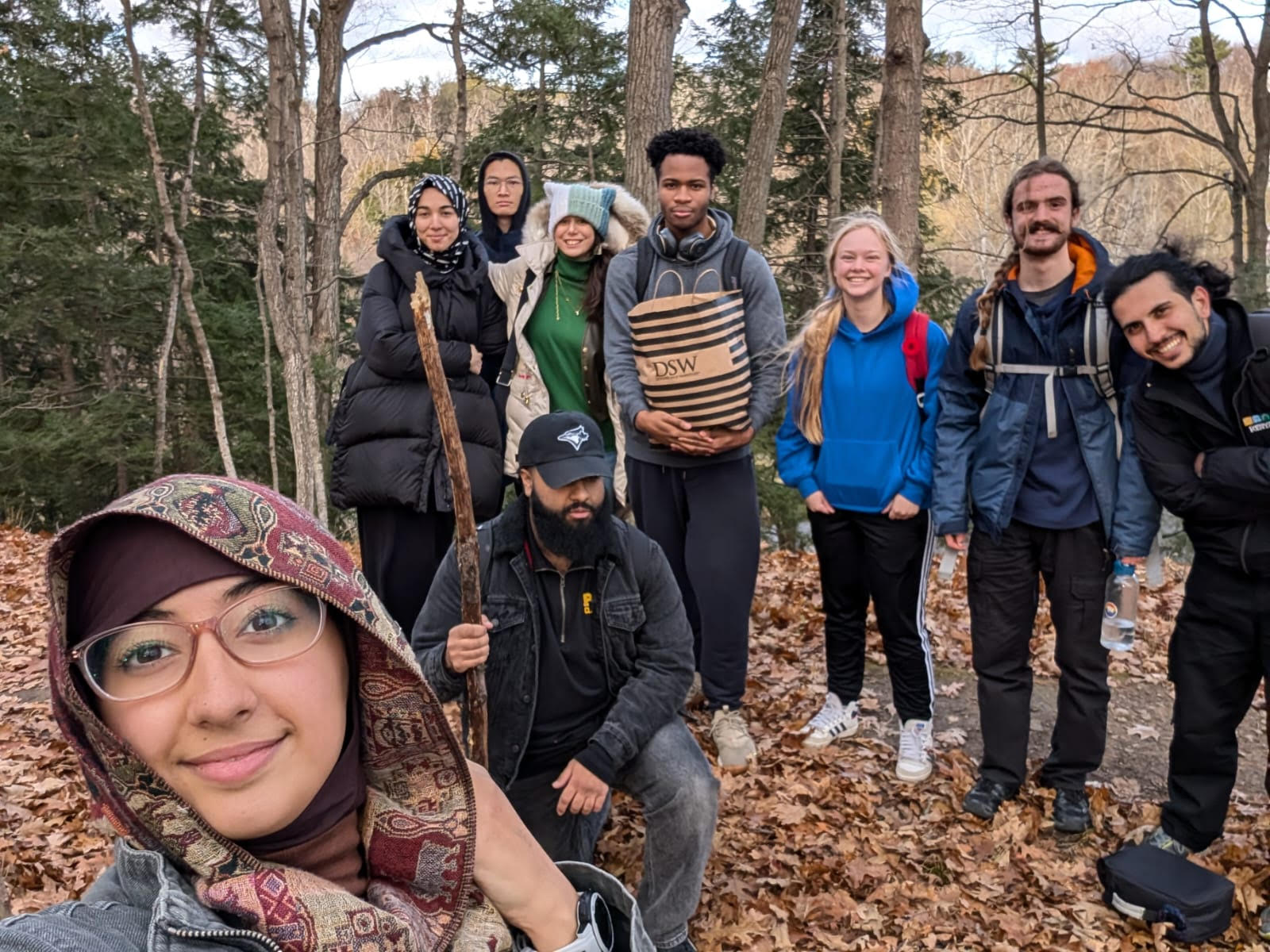A dialogue between the centuries
An interview with The Symposium about the importance of discussion-based learning in philosophy education and beyond.
Back in the first year of my undergraduate studies, my friend informed me about a book club that a couple of students were starting. Partly from personal curiosity and partly to respect my friend’s suggestion to join the club, I headed into one of The Symposium’s meetings on the sixth floor of Maanjiwe nendamowinan.
Little did I know that this book club would soon transform into a trusted and safe space to hold important conversations about the world we live in, and further our philosophical education in the process.
Philosophy is fundamentally furthered by dialogue—without a designated space and time to exchange ideas, think critically, and enjoy intellectual exploration without the mandates of performance, people cannot develop their minds.
Open to students both in and outside of philosophy, The Symposium, under the Philosophical Academic Society (PAS), offers various ways students can engage in intellectual and creative thought with like-minded peers.
A major goal of The Symposium is to encourage dialogue between people from diverse backgrounds like students, professors, and more. “What [we] try to do is bring philosophy to people outside of the program, whether it’s by movie nights or poetry sessions,” said the president of PAS, Eithar Abdulkareem, a philosophy specialist.
With The Symposium’s designated book club, focused (as opposed to open) discussions, poetry nights, and community events, “we try to show people that even if you are in another discipline, you can still participate in philosophy because philosophy is simply a way of life, it’s a way of seeing the world,” added the club’s senior advisor Mariam Khursheed, who is studying history, education, and philosophy.
The tradition of philosophy centers around charitably and humbly understanding an idea and listening to it in its entirety before responding. In our fast-paced culture, dedicating moments of our day to deep reflection and letting go of preconceived notions is simply solace.
The abstract and the practice: striking the essential balance
In mainstream culture, we picture philosophy as an elitist academic endeavour divorced from the practicalities of daily life. What’s the point of thinking about living when you can just go and live? The Symposium aims to establish a common ground between lived realities and meditatingon our experiences to enrich ourselves.
“One thing that philosophy does to sometimes deter people away is that [it makes itself] very abstract; [here at The Symposium], we try to apply our ideas to practical reality, but also recognizing that the ideas themselves are important too,” expanded Eithar.
For example, Eithar reflected on the importance of contemplation as a divine act, and how developing ourselves in our minds can help us move through the world with more grace. In my first-year philosophy class, we discussed the implications of living in a simulated reality and the classical “mind-body” problem.
The mind-body dualism problem in philosophy explains how our consciousness interacts and influences the body. Why is it that when we find something funny, which is a mental experience, we are driven to laugh out loud or snort, which is a physical response? How can such abstract ideas be in any way useful in our lives as students and young adults?
“Let’s find ways to apply these ideas and contemplative practices to how we see the natural world,” said Eithar, “and maybe these abstract ideas of contemplation can actually have practical consequences to our relationship with nature and the ecological crises.”
Mariam cited that her first interaction with philosophy was through a critical reasoning class, where she was taught to properly dissect arguments, avoid logical fallacies, and think through ideas with structural integrity.
Think back to the last challenging conversation you had with someone. I think back to many conversations I’ve had where I was so preoccupied with my contribution to the dialogue that I totally forgot to listen to what my friend was genuinely saying. To this, Mariam responded, “We are trying to break that culture, but it’s hard to break such a massive culture in a small space. [When you walk into our space], you are not coming here to win. You are coming here to understand others and yourself, and get closer to the truth.”
The wide reach of philosophy and how to get involved
From participating in politics to pursuing law, philosophy equips individuals with a cognitive toolkit to assess, understand, synthesize, and respond constructively and compassionately to the plethora of arguments and information that surrounds us daily.
Getting involved in The Symposium is simple—just show up to any of their meetings, a catalogue of which can be easily found on their Instagram page @symposium.pas or simply visit their website to learn more about the variety of opportunities for discussion and engagement the club offers.
Excitingly, The Symposium also hosts the Symposium Studios, an opportunity for students to share their creative creations, which includes everything from painting to poetry, and much more. For dates and locations, please visit the aforementioned website and social media page.
The philosophical tradition is timeless and diverse—from meditations on love and happiness to the ethical implications of our increasingly evolving technologies, philosophy helps build robustness of mind so that we can navigate the complexities of the world and our place in it. The Symposium is a small but essential part of that tradition.
Opinion Editor (Volume 51); Associate Opinion Editor (Volume 50) — Mashiyat (Mash) is a third-year student studying Neuroscience and Professional Writing and Communication (PWC). As this year’s Opinion Editor, Mash hopes to use her writing, editorial, and leadership skills in supporting student journalism in the essential role it plays in fostering intellectual freedom and artistic expression on campuses. When she’s not writing or slaving away at school, Mash uses her free time cooking cultural dishes, striking up conversations with strangers, and being anxious about her nebulous career plans. You can connect with Mash on her LinkedIn.


